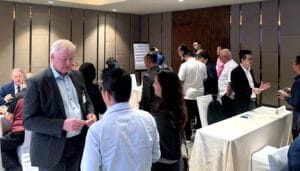IWA found help in Thailand for the programmer shortage

Half of the personnel of the Finnish software company IWA work in Thailand. Without Finnpartnership, the subsidiary that offers work to local programmers would not have been established.
IWA, which develops Internet and mobile services, has encountered the same problem in Finland as many other IT growth companies. There is a shortage of qualified software programmers.
IWA has solved the problem by establishing a subsidiary in Thailand where nearly 20 local programmers work under Finnish operative management.
Jussi Virtanen, CTO and one of the founders of IWA, says that the first contact with Thailand was made in 2010 through the company’s networks. They found a company in Kohn Kaen in Northeast Thailand that had partner potential. An on-site visit led to starting the cooperation.
“We received business partnership support from Finnpartnership in order to identify partners and evaluate the identified partner in Thailand in more detail”, says Virtanen.
A subsidiary was the best alternative
IWA ordered programming from a Thai subcontractor for a few years. However, the cooperation left room for improvement. Gradually the concept evolved that in order to improve operations and cut costs, it would make sense for the Finnish company to establish its own subsidiary in Thailand.
“The partner had plenty of programming skills, but the differences in company cultures and practices were great. For example, it is vital in this industry that messages are responded to right away in emergencies, so that customer problems can be resolved quickly”, explains Virtanen.
IWA also received support from Finnpartnership to research the issues around establishing the subsidiary.
“Without Finnpartnership, we would not have been able to establish the subsidiary, as the company was just getting started and we could not have afforded to spend tens of thousands of euros on consultant and lawyer fees”, says Virtanen.
Word of mouth effective for recruitment
Jussi Virtanen lived in Thailand when the company was established and handled the arrangements together with a locally hired assistant.
Getting established was greatly assisted by being accepted into an innovation programme organised by the Thai government, which encourages technology companies to enter the country. For example, companies in the programme are allowed to have foreign majority ownership, which otherwise is not allowed for European companies.
“In addition, the work authorisation matters for foreign workers have been handled well.”
IWA had to start building the team from scratch. Word of mouth was used, however, to recruit a few good people, who were then able to provide tips on student colleagues or former workmates.
“We never had to actively recruit”, says Virtanen.
Differences in company culture the greatest challenge
Virtanen is satisfied with his decision to go to Thailand. After a little effort, IWA found good employees for its team and they have constantly improved their basic qualifications, such as English skills.
“These skills will significantly improve their career opportunities in the future”, says Virtanen.
IWA also regularly organises apprenticeships for at least two students from a local university, which strengthens the cooperation with universities.
“In addition to the apprenticeships, we hold lectures and workshops to improve the local level of education.”
Virtanen identifies differences in corporate culture as the greatest challenge. There is barely a hierarchy in Finnish IT firms, while in Thailand managers and senior colleagues are obeyed perhaps even too diligently.
“We want to give employees freedom, but that also requires taking initiative and carrying responsibility.
Virtanen says that programming can be done anywhere in the world. However, time differences require some special arrangements. The time difference between Finland and Thailand is 4-5 hours depending on the time of year.
“In practice, communication to Thailand must be handled before lunch time in Finland.”
However, the time difference can also be beneficial, as the Thai office has often solved the problems in an urgent project by the time the customer in Finland is starting their day.
Vietnam next target
IWA’s key customer segment includes the real estate and construction industries. The company develops, for example, tools for assessing the environmental impact of residential areas and buildings. In addition to Finland, they have customers along the Persian Gulf.
The software business is rapidly growing. Virtanen expects that IWA’s turnover will increase to EUR 2.8 million this year from EUR 2 million in 2017.
The company intends to hire more employees in Thailand. According to Virtanen, recruitment is still challenging, but networks have been established with universities that educate programmers, among others.
Encouraged by the good experience in Thailand, IWA is now considering expanding their operations to Vietnam. According to Virtanen, the goal is to establish a subsidiary that focuses on software development.
“We intend to apply for business partnership support from Finnpartnership again, so that we can cover some of the costs incurred from preparing to establish a subsidiary there.”
Share on social media


